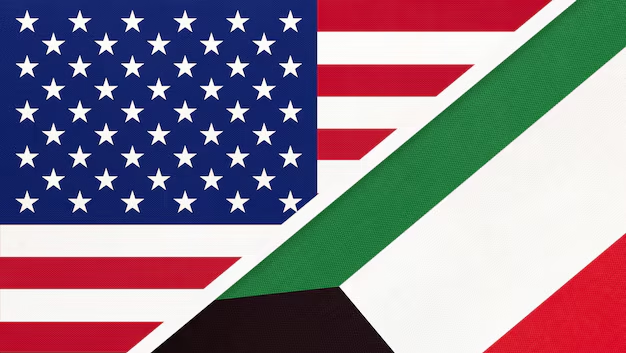Kuwait and U.S. Strengthen Economic Ties in High-Level Meeting
Kuwait and the United States have long maintained a robust partnership, characterized by deep-rooted diplomatic ties and extensive economic collaboration. A recent meeting between Kuwaiti Ambassador to the U.S., Sheikha Al-Zain Al-Sabah, and U.S. Secretary of Commerce Howard Lutnick has further underscored the commitment of both nations to strengthening economic relations and exploring new avenues for cooperation. This discussion reflects the broader strategic vision shared by both countries, emphasizing investment opportunities, technological advancement, and sustainable development initiatives.
Historical Partnership and Diplomatic Bonds
The foundation of the Kuwait-U.S. alliance was solidified during the Gulf War in 1991, when the United States led an international coalition to liberate Kuwait from Iraqi occupation. This pivotal moment not only showcased military collaboration but also established a lasting diplomatic relationship that has continued to evolve over the decades.
Ambassador Sheikha Al-Zain highlighted the profound gratitude of the Kuwaiti people for the U.S.’s leadership and the valor of its armed forces during this critical period. She emphasized that the success of Operations Desert Shield and Desert Storm was not solely a military achievement but also represented an innovative financial model. Kuwait and its allies played a significant role in funding these operations, ensuring that the U.S. and its taxpayers did not bear the financial burden of Kuwait’s liberation. This approach not only covered all costs but also generated a financial surplus, exemplifying the strength of international cooperation and fiscal responsibility.
Since then, Kuwait and the U.S. have continuously expanded their diplomatic engagement, signing numerous agreements on trade, security, and cultural exchange. The relationship has been further strengthened through high-level diplomatic visits, strategic dialogues, and cooperative initiatives in education, defense, and economic development.
Economic Collaboration and Trade Relations
The economic ties between Kuwait and the United States are substantial and multifaceted. The United States remains one of Kuwait’s largest trading partners, with a diverse range of goods and services exchanged between the two nations. In 2023, Kuwait’s exports to the U.S. were valued at approximately $1.71 billion, with primary exports including refined petroleum and crude petroleum. Conversely, U.S. exports to Kuwait amounted to around $3.74 billion, featuring products such as automobiles, petroleum gas, and packaged medicaments. This trade dynamic reflects a balanced and mutually beneficial economic relationship.
During their meeting, Ambassador Sheikha Al-Zain and Secretary Lutnick discussed strategies to enhance this economic partnership further. Kuwait’s commitment to open-market policies that support business growth was a focal point, with an emphasis on creating an environment conducive to investment and innovation. Both parties acknowledged the importance of diversifying economic cooperation beyond traditional sectors, exploring opportunities in technology, renewable energy, and infrastructure development.
Kuwait has increasingly focused on attracting foreign investment and fostering entrepreneurship. The government has implemented reforms to streamline business regulations, enhance transparency, and create incentives for international investors. With a strategic location in the Gulf region, Kuwait serves as a gateway for businesses looking to expand into the Middle East and North Africa (MENA) markets.
Strategic Dialogue and Future Prospects
The sixth round of the Kuwait-U.S. Strategic Dialogue, held virtually from December 9 to 11, 2024, reinforced the shared commitment to deepening bilateral relations. This dialogue encompassed various areas, including defense, cybersecurity, trade, investment, health challenges, climate change, and artificial intelligence. Both nations expressed their dedication to exploring additional areas of collaboration and formalizing agreements to expand on existing frameworks.
One of the key areas of focus was technological advancement and digital transformation. Kuwait has been investing in smart infrastructure projects, including digital banking, fintech solutions, and smart cities, aligning with global trends in technological innovation. By collaborating with U.S. firms and research institutions, Kuwait aims to accelerate its digital transformation and position itself as a leader in the regional tech ecosystem.
Additionally, discussions included expanding cooperation in the renewable energy sector. As Kuwait seeks to diversify its energy mix and reduce its carbon footprint, U.S. expertise in clean energy solutions, including solar and wind power, presents a significant opportunity for collaboration. Joint projects in energy efficiency, water desalination, and sustainable urban planning were also explored as part of the long-term strategic partnership.
Another critical aspect of the dialogue was strengthening people-to-people ties through educational and cultural exchange programs. The United States has been a preferred destination for Kuwaiti students pursuing higher education, with thousands enrolled in American universities. Enhancing academic partnerships and promoting cross-cultural exchanges will further solidify the strong bonds between the two nations.
Defense and Security Cooperation
Beyond economic collaboration, defense and security cooperation remain vital pillars of the Kuwait-U.S. relationship. Kuwait hosts U.S. military personnel and plays a key role in regional security efforts. Both countries continue to work together on counterterrorism initiatives, intelligence sharing, and military training programs to ensure regional stability.
The defense partnership between Kuwait and the U.S. has evolved to include cybersecurity and emerging threats. With the increasing risk of cyberattacks on critical infrastructure, both nations have recognized the need for joint efforts in cybersecurity training, threat assessment, and policy development. This collaboration aims to strengthen digital resilience and protect key sectors, including finance, healthcare, and government operations.
Conclusion
The meeting between Ambassador Sheikha Al-Zain Al-Sabah and Secretary of Commerce Howard Lutnick exemplifies the enduring and evolving partnership between Kuwait and the United States. By acknowledging their shared history and focusing on future economic collaboration, both nations are poised to strengthen their alliance further. As they explore new avenues for cooperation, particularly in emerging sectors such as technology, renewable energy, and cybersecurity, the Kuwait-U.S. relationship stands as a testament to the benefits of sustained diplomatic engagement and mutual economic interests.
Moving forward, the commitment of both countries to fostering innovation, enhancing trade relations, and promoting security cooperation will continue to shape the trajectory of their partnership. The future of Kuwait-U.S. relations remains bright, driven by a shared vision for economic prosperity, strategic collaboration, and long-lasting friendship.
Do follow gulf magazine on Instagram
for more information click here


